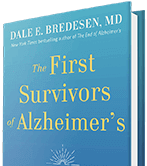July 21, 2021
Tsunami

A fascinating discovery of ridges etched in the ancient ocean floor (and now buried beneath) reflects the massive, mile-high tsunami that resulted from the asteroid splash that caused the death of the non-avian dinosaurs (a mile-high tsunami, now that’s a wave you don’t want to get caught paddling out through!).
And as if the ongoing COVID-19 tsunami (which thankfully has been mitigated to a large extent, the delta variant notwithstanding) is not enough, the Aduhelm tsunami — the gaffe that keeps on giving — continues, with the Cleveland Clinic and Mt. Sinai announcing they will not prescribe the new anti-amyloid drug. Kaiser has also indicated it has no plan to prescribe Aduhelm, and it will be of more than passing interest to see whether Medicare decides against support. Furthermore, a poll of neurologists and other doctors showed that over 90% felt that the risk of Aduhelm outweighed the potential benefit, and over 85% felt the drug should not have been approved. The Head of the FDA called for an investigation into the FDA itself, and when leaders call for investigations into their own administrations, they are usually attempting to keep their jobs.
Way back in 1910 — just a few years after the description of Alzheimer’s disease — the medical education tsunami, referred to as The Flexner Report, was released, leading to the closure of over half of American medical schools and putting in place the education model that remains to this day. Unfortunately, that model is now woefully outdated: to achieve success with complex chronic illnesses such as Alzheimer’s disease, we must go far beyond simple prescription pad medicine — to include computer-based algorithms, volumetric imaging, much larger data sets, health coaches, nutritionists with biochemical and genetic expertise, personalized protocols, multi-variable clinical trials, and many other features that were not available in 1910. This is exactly what we are doing now, and we all have roles to play in this new medicine, including those of us who undergo treatment. It will take our collective expertise and experience to continue to improve outcomes for those with cognitive decline or risk for decline.
The Aduhelm debacle provides further impetus for a true revolution in the treatment of Alzheimer’s disease, with global prevention programs, early reversal programs, and future generations in which Alzheimer’s is optional instead of unavoidable. Momentum is gathering for this new, Alzheimer-destroying tsunami, and that will be a tsunami that is beautiful to behold.





